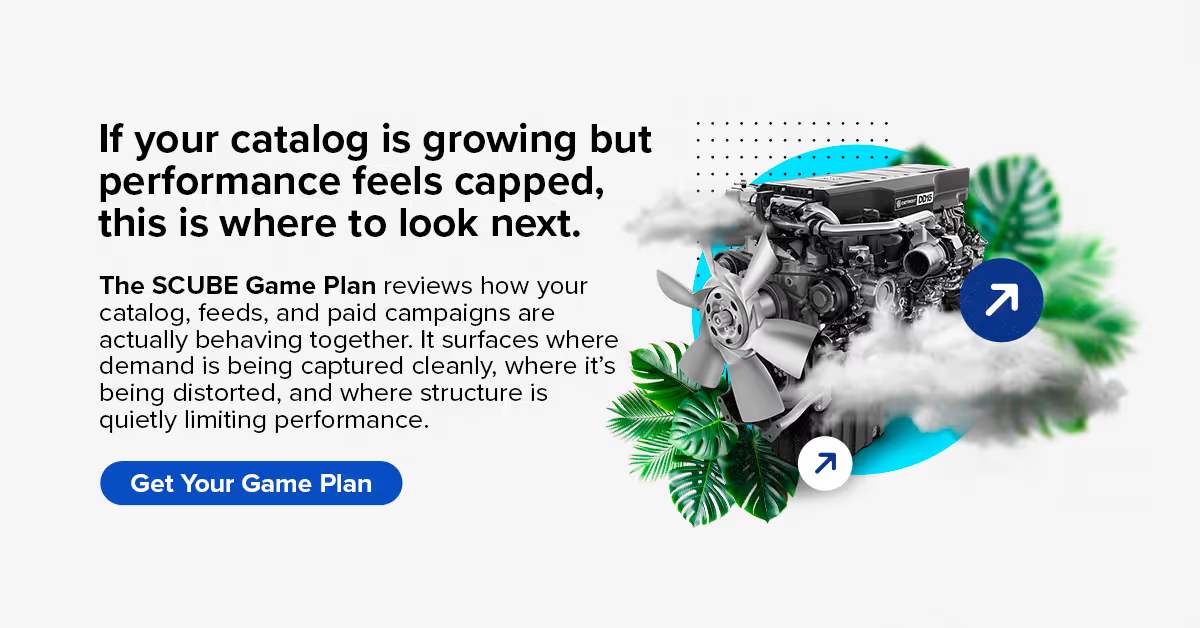
Motorsports fans represent some of the most passionate and engaged audiences for digital advertising. I've seen firsthand how niche segments like drifting and rally fans have unique characteristics that require specialized advertising approaches. These dedicated enthusiasts aren't just casual observers—they invest heavily in their passion, both emotionally and financially.
At Scube Marketing, we've helped numerous aftermarket parts sellers connect with these valuable audience segments. The results consistently show that when you understand what drives these fans, you can create highly effective ad campaigns that deliver exceptional ROI.
In this guide, I'll share practical strategies for targeting these niche motorsports audiences with paid advertising that drives measurable business results. Let's look at what makes these fans unique and how to reach them effectively.
Niche motorsports like drifting and rally racing create deeply dedicated fan communities. Understanding what motivates these audiences forms the foundation of effective advertising.
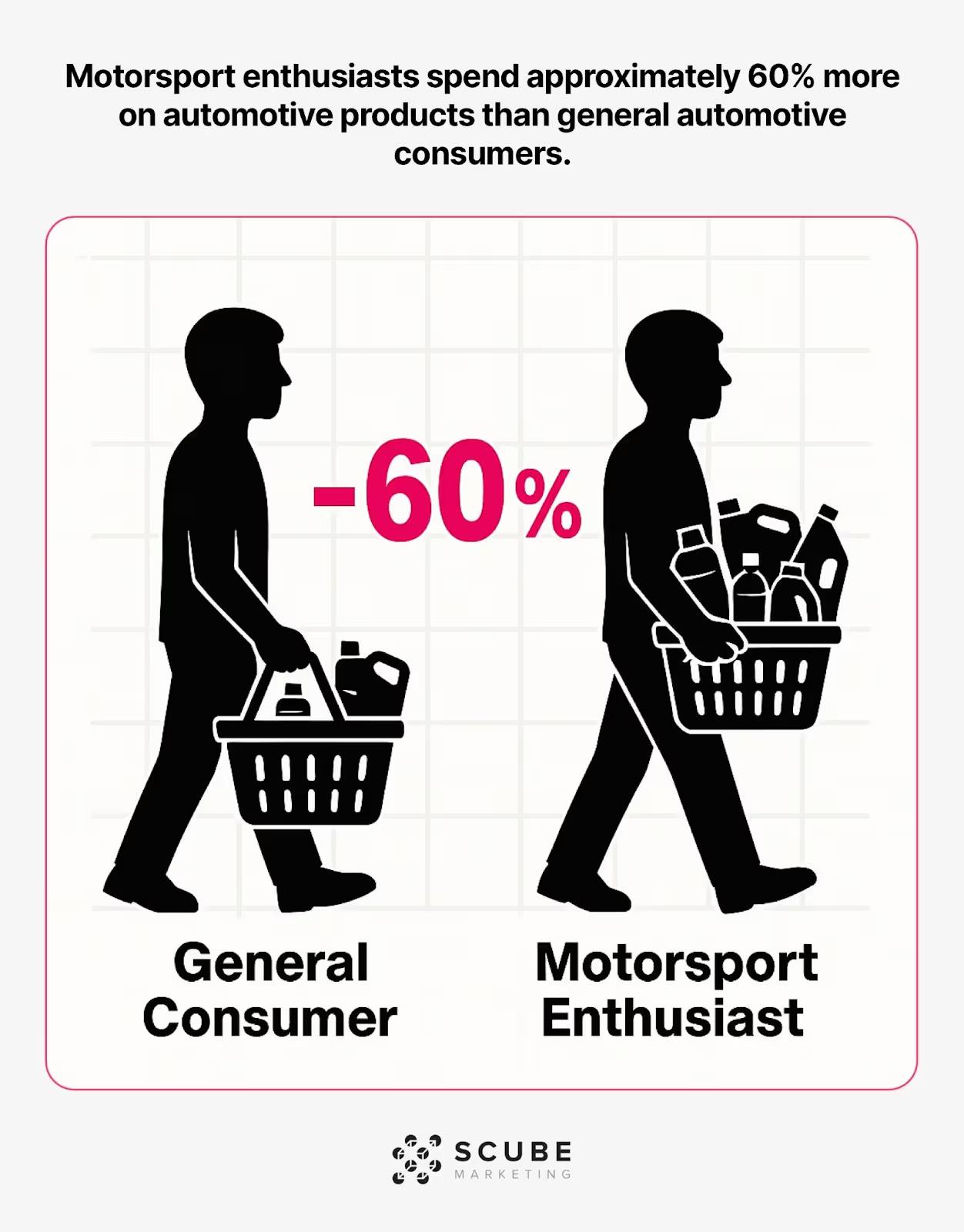
What makes these fans so valuable? Motorsport enthusiasts spend approximately 60% more on automotive products than general automotive consumers. (Source: Baylor University)
This spending power, combined with their passion and influence within automotive communities, makes them prime targets for aftermarket parts and accessories businesses. Let's examine what makes each group distinct.
Drifting fans stand out for their deep appreciation of style and technical skill. They value the artistic elements of the sport just as much as the competition aspects.
What sets them apart is their engagement with content. These enthusiasts actively seek technical information, build guides, and performance specifications. They follow drivers on social media and engage with video content for longer periods than average automotive audiences.
The drifting community values authenticity above all else. Brands that demonstrate genuine knowledge of drifting culture see significantly higher engagement rates than those using generic motorsport messaging. This authenticity requirement makes audience targeting both challenging and rewarding when done correctly.
Rally fans differ notably from other motorsport enthusiasts in their appreciation for all-terrain performance and durability. They follow competitions across diverse environments—from snow and ice to desert and forest roads.
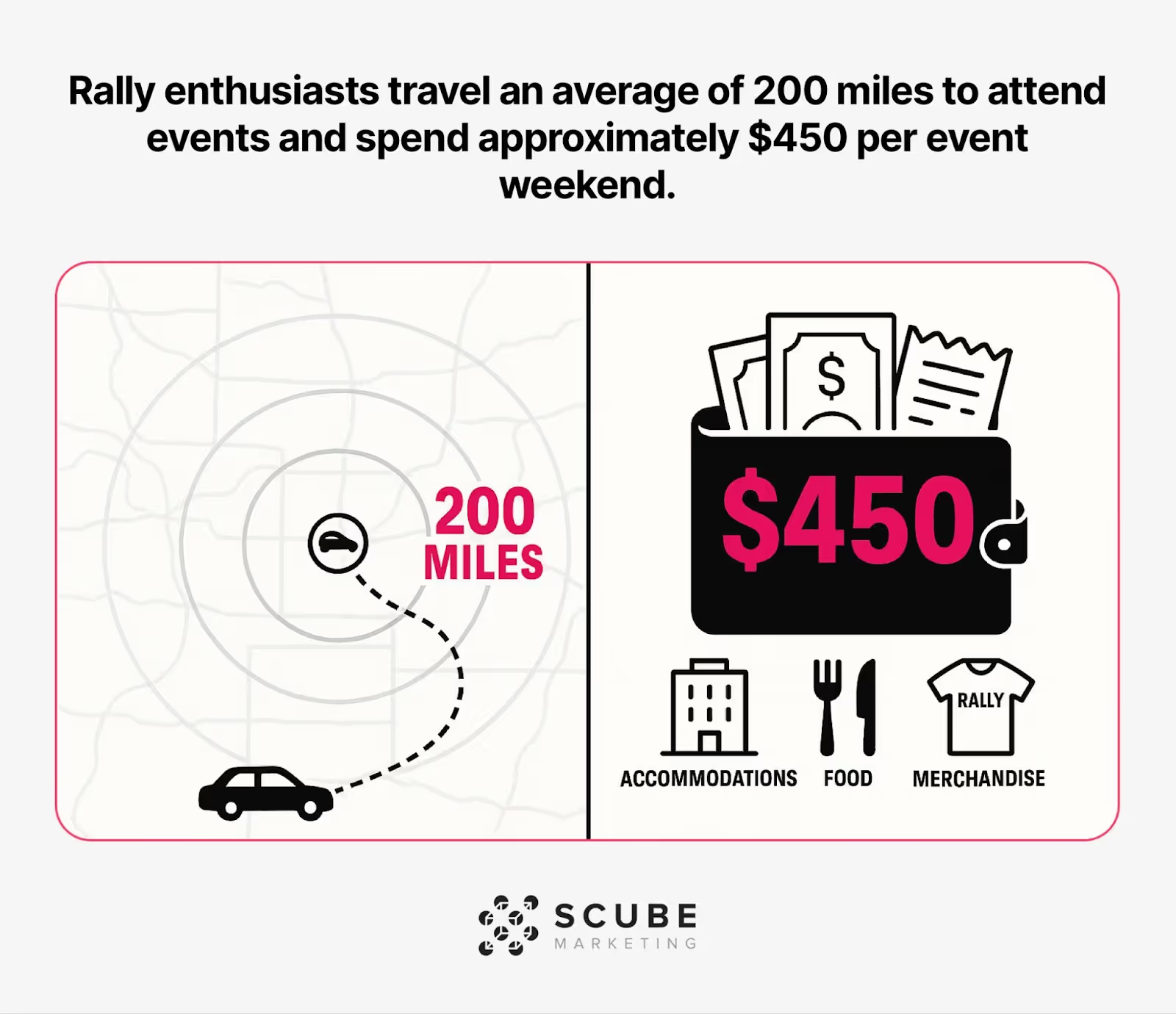
The economic impact of rally events extends beyond the races themselves, with rally enthusiasts traveling an average of 200 miles to attend events and spending approximately $450 per event weekend on accommodations, food, and merchandise. (Source: North Central Michigan College)
These fans value technical knowledge about vehicle modifications for different conditions. They respect the engineering achievements that allow rally cars to perform in extreme environments. Brands that can speak authoritatively about these aspects connect more effectively with this audience.
Looking for a clear, connected view of how auto parts marketing actually works across SEO, PPC, feeds, and marketplaces? Explore our complete guide to auto parts marketing and ecommerce →
Let's compare how drifting and rally fans differ demographically and psychographically. This information shapes targeting parameters and creative approaches for your campaigns.
This demographic information provides valuable insights for targeting. Understanding these differences shapes how we approach each segment in our ad strategies.
Beyond demographics, these fans share key psychographic traits that influence their purchasing decisions:
These traits make these audiences particularly valuable for aftermarket parts sellers. Their dedication translates to higher lifetime value when properly engaged with relevant advertising.
Choosing the right platforms is critical when targeting niche motorsports fans. Each platform offers different targeting capabilities and content formats that might work better for specific segments.
I've found that a multi-platform approach works best, with each platform playing a specific role in the overall strategy. Let's examine the most effective options.
Facebook and Instagram remain powerful platforms for reaching motorsport enthusiasts, largely due to their sophisticated interest targeting options. According to Motorsport UK regulations documentation, motorsport participants often belong to organized clubs and associations, which creates identifiable social groupings that Facebook's algorithm can recognize. (Source: Motorsport UK)
When setting up targeting for these platforms, focus on these essential parameters:
For Facebook specifically, how can you effectively boost your posts to reach these niche audiences? The key is starting with organic content that genuinely engages the community before applying paid promotion. This approach ensures your sponsored content feels authentic to these discerning enthusiasts.
Instagram works particularly well for drifting content due to its visual nature. Use Instagram Stories ads to showcase dynamic content that appeals to the style-conscious drifting community.
YouTube deserves special attention in your motorsports advertising strategy. Both drifting and rally fans spend significant time on this platform researching techniques, equipment, and event coverage.
The platform allows you to target users based on their viewing habits, which is particularly effective for reaching motorsport enthusiasts during their research phase. Consider these targeting approaches:
When creating YouTube ads for motorsport audiences, remember that skip rates tend to be high. Lead with your most compelling content in the first 5 seconds. Technical content performs particularly well, especially when it demonstrates product benefits in authentic racing environments.
While mainstream social platforms offer scale, don't overlook specialized websites and forums where dedicated enthusiasts gather. These niche platforms often provide highly targeted advertising opportunities with less competition.
For drifting, platforms like Driftworks Forum, Zilvia, and specialized Discord servers attract the most engaged fans. Rally enthusiasts frequently visit platforms like DirtFish, Rally America, and specialized subreddits.
These specialized platforms may have smaller audiences, but the targeting precision often delivers superior return on ad spend. I've seen conversion rates up to 3x higher on these niche platforms compared to mainstream social media for the same motorsport product categories.
Forums and specialized platforms also offer valuable opportunities for audience targeting research. The discussions in these communities reveal specific terminology, pain points, and product interests that can inform your broader advertising strategy.
Once you've identified the right platforms, creating resonant creative becomes your next challenge. Motorsport enthusiasts, particularly in niche communities like drifting and rally, have high standards for the advertising they engage with.
Let's examine the most effective creative approaches for these audiences.
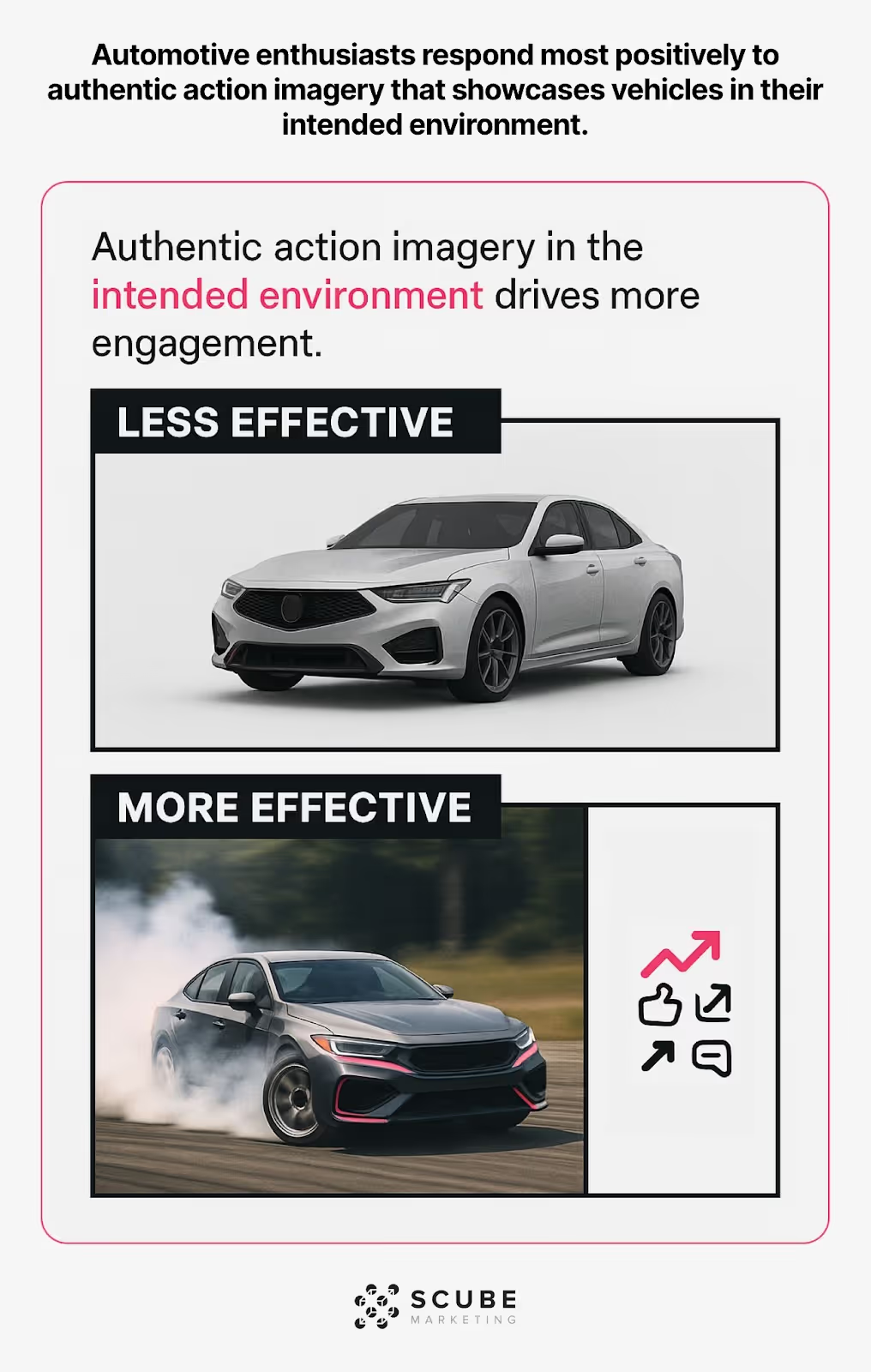
The visual components of your ads play a crucial role in stopping the scroll of motorsport enthusiasts. According to Audi's comprehensive market research, automotive enthusiasts respond most positively to authentic action imagery that showcases vehicles in their intended environment rather than static showroom displays. (Source: Audi Report)
For maximum engagement, incorporate these visual elements in your creative:
Video content typically outperforms static images for both drifting and rally audiences. Even simple animations showing mechanical functions or performance benefits drive higher engagement than static alternatives.
Writing effective ad copy for motorsport enthusiasts requires an understanding of their technical knowledge and community language. These audiences can quickly identify generalized, non-specific messaging that lacks authentic expertise.
In my work with aftermarket parts sellers, I've found these copy approaches work best:
1. Use discipline-specific terminology correctly
2. Address specific performance challenges unique to each discipline
3. Balance technical specifications with emotional benefits
4. Acknowledge the community aspects of participation
5. Avoid overly sales-driven language that feels inauthentic
Remember that different copy approaches work better for different platforms. Facebook and Instagram users respond well to benefit-focused messaging, while YouTube viewers engage more with technically detailed content that demonstrates expertise.
The balance between technical details and emotional appeal represents one of the most important creative decisions when advertising to motorsport fans. Let's examine how this balance differs between platforms and audience segments:
This table provides a framework for balancing these elements, but always let your testing data guide refinements for your specific products and audience segments.
For drifting audiences, the emotional appeal often centers around style, self-expression, and the culture surrounding the sport. For rally enthusiasts, emotional hooks typically focus on overcoming challenges, durability in extreme conditions, and technical innovation.
Proper campaign structure creates the foundation for both initial performance and ongoing optimization. For niche motorsports audiences, certain structural approaches consistently outperform standard practices.
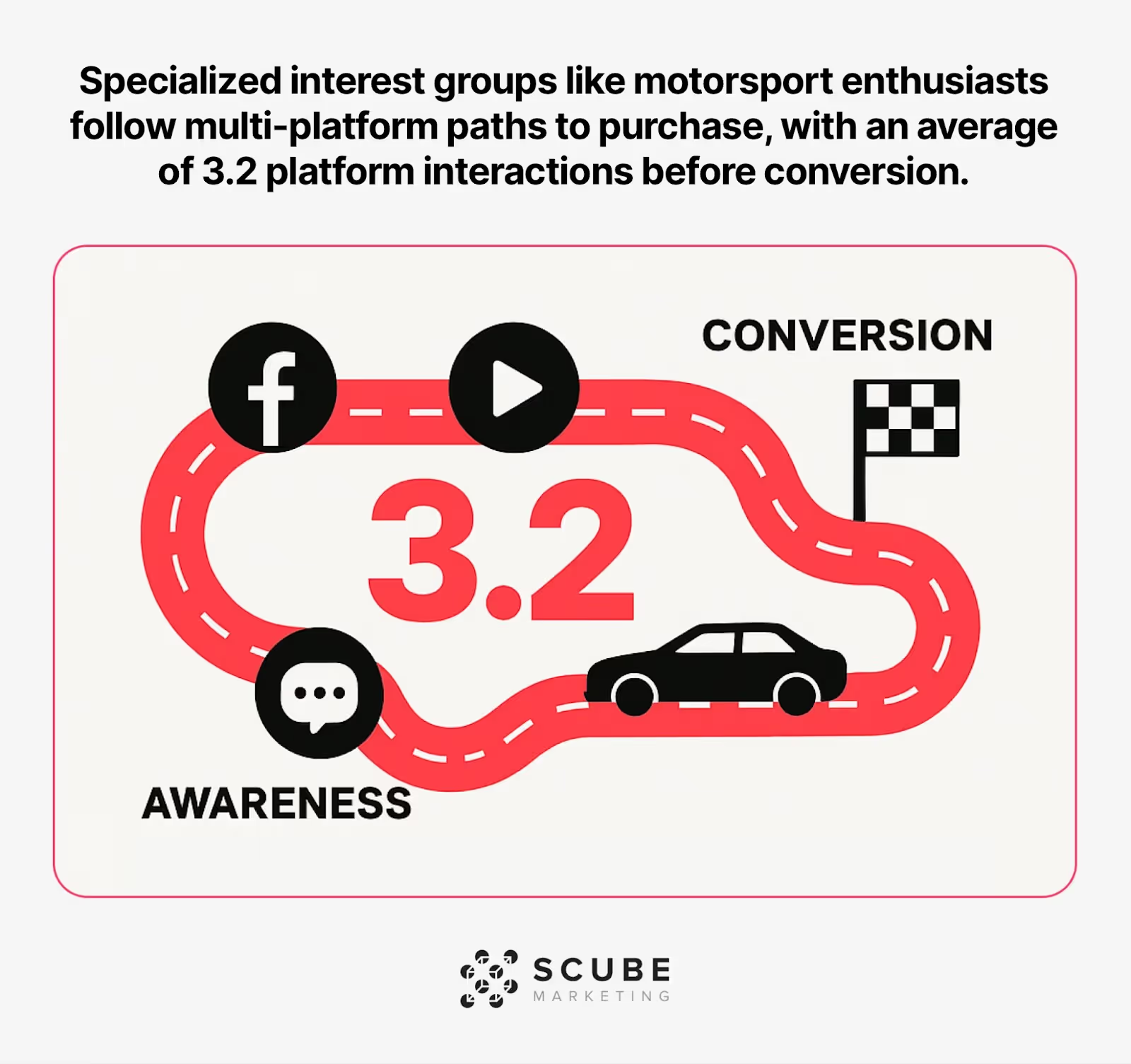
Strategic budget allocation ensures you maximize exposure while maintaining sustainable customer acquisition costs. According to recent hospitality industry customer behavior research, specialized interest groups like motorsport enthusiasts tend to follow multi-platform paths to purchase, with an average of 3.2 platform interactions before conversion. (Source: Marriott)
For most motorsport campaigns, I recommend this budget allocation approach:
This distribution balances reach with efficiency while maintaining a testing budget for discovering new opportunities. Remember that optimal allocation varies based on your specific products and audience segments.
Effective segmentation allows for more personalized messaging and better performance tracking. For motorsport audiences, segment based on:
1. Discipline-based (drifting vs. rally vs. mixed interest)
2. Engagement level (casual fans vs. active participants)
3. Product category interest (performance parts, tools, accessories)
4. Knowledge level (beginners vs. experienced enthusiasts)
5. Purchase intent (researchers vs. active shoppers)
Create separate campaign structures for each primary segment to enable proper budget control and performance comparison. This approach helps identify your most profitable audience segments and adjust spending accordingly.
Remarketing campaigns can significantly increase conversion rates when properly structured for motorsport audiences. These enthusiasts often research extensively before purchasing, making retargeting particularly effective.
Create retargeting segments based on visitor behavior with this framework:
This segmented approach ensures your messaging matches the visitor's position in the customer journey. For motorsport enthusiasts, emphasizing technical compatibility and performance benefits in retargeting campaigns typically outperforms discount-focused messaging.
Proper measurement allows you to continuously improve performance. For niche motorsports campaigns, certain metrics and optimization approaches yield better results than standard practices.
When tracking performance for motorsport audience campaigns, focus on these key metrics:
For motorsport audiences, I've found that engagement metrics often predict conversion potential better than immediate click metrics. These enthusiasts typically engage with content multiple times before converting.
Systematic testing drives continuous performance improvements. For motorsport campaigns, prioritize testing these elements:
1. Technical specificity in ad copy (detailed vs. general)
2. Creative focus (product in use vs. technical details)
3. Targeting parameters (interest combinations)
4. Landing page content depth (technical detail level)
5. Offer structuring (performance value vs. price appeal)
Implement a value-based bidding approach that accounts for the higher lifetime value of motorsport enthusiasts. This approach allows you to bid more aggressively for high-potential audiences while maintaining overall efficiency.
Once you've identified winning campaign elements, follow these principles for scaling success:
1. Expand successful audience segments with lookalike audiences
2. Increase budget on top-performing platforms incrementally (15-20% per week)
3. Maintain the winning creative approach while testing variations
4. Expand into complementary product categories with proven audiences
5. Consider international expansion where motorsport interest overlaps
Avoid the common mistake of scaling too quickly. Motorsport audience campaigns typically benefit from deliberate, measured scaling that maintains the targeting precision that drove initial success.
Targeting niche motorsports fans like drifting and rally enthusiasts presents unique opportunities for advertisers willing to understand these passionate communities. The keys to success lie in platform selection tailored to audience behaviors, creative that balances technical specificity with emotional appeal, and campaign structures that enable continuous optimization.
These enthusiasts value authenticity above all else. Generic motorsport messaging typically underperforms compared to discipline-specific content that demonstrates genuine understanding. Invest time in understanding the unique aspects of drifting and rally communities, and you'll build campaigns that not only drive short-term sales but also build lasting brand affinity.
Whether you're selling performance parts, tools, gear, or related services, the passion of motorsport enthusiasts translates to higher engagement, customer loyalty, and lifetime value when properly addressed through targeted advertising campaigns.
Ready to accelerate your advertising to motorsport audiences? Start with audience research, platform selection, and creative development focused on authenticity and technical relevance. The results will be well worth the specialized approach.
